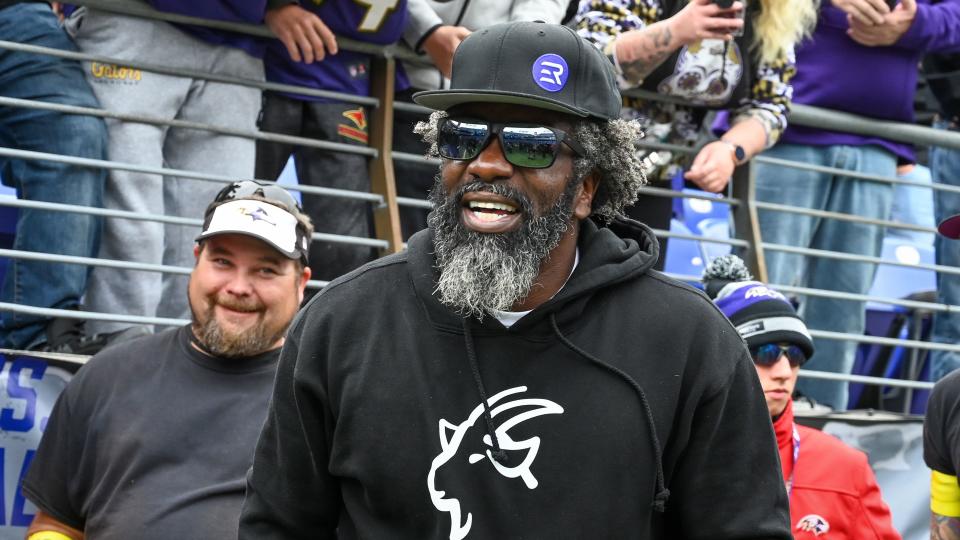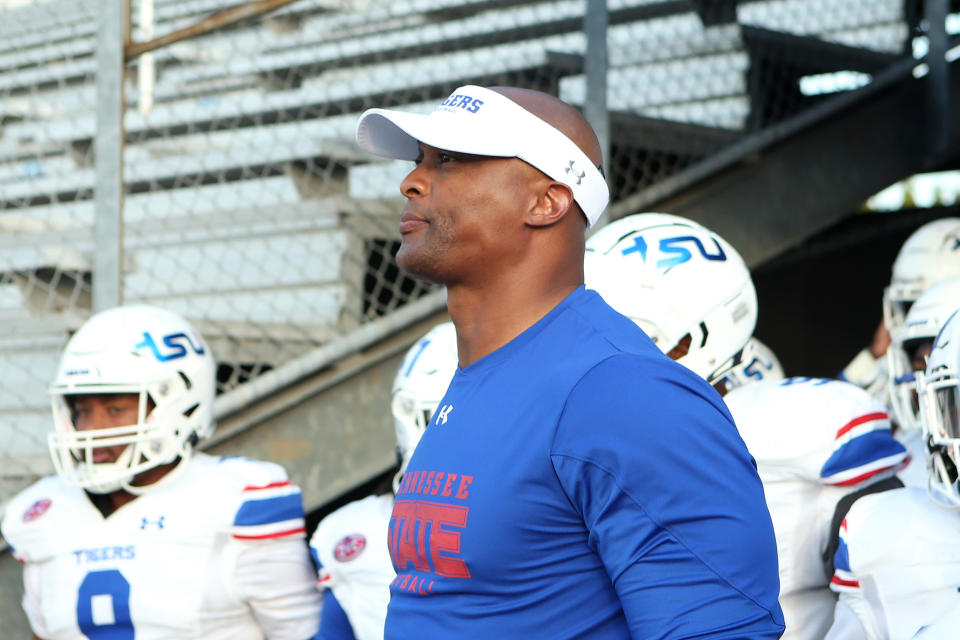Some things can’t be fixed quickly.
And they sure can’t be fixed through an Instagram Live rant.
Those are sentiments Ed Reed either didn’t consider or didn’t understand when he began his brief and bizarre tenure as head football coach at Bethune-Cookman University, a tenure that ended Saturday, before he’d even signed a contract.
But not before he’d taken to social media more than once to scream and shout about the school and its administrators like a 15-year-old upset about the school cafeteria choices. To be clear, Reed wasn’t entirely wrong: It’s not egregious to expect your new office to be cleaned out of the prior coach’s stuff, and Bethune-Cookman, like many Historically Black Colleges and Universities (HBCUs), has funding issues, not to mention it suffered flooding and damage due to Hurricane Ian just a few months ago.
But when your campus issues run deep, making sure the football team’s practice field is state-of-the-art isn’t near the top of the list of priorities. On Monday, several B-C students were protesting and calling for the Board of Trustees to step down because of mold in dorms and other concerns (not a problem exclusive to Bethune-Cookman or HBCUs).
Few people understand that like Eddie George. For all the attention Deion Sanders demanded by blessing Jackson State with his presence, George’s hiring at Tennessee State in 2021 flew under the radar. That’s partially because George doesn’t have a film crew following him at all times as Sanders did.
Tennessee State is a project George took on willingly and with the understanding that improvements take time. He also doesn’t appear to view the HBCU program solely as a stepping stone on his way to something better.
“I didn’t want anything to do with coaching because I saw the stress and all of the challenges that coaches go through on a day-to-day basis,” George explained last week on the Memphis-based “Rise & Grind” podcast. “But I asked myself the question: Will this make a change in the lives of the young men? … To be asked to be the leader of an HBCU and change, change a lot of the things that’s going on, not just on the football field but what’s happening away from it.”
George also understands why TSU faces major hurdles: The state withheld funds from the school for decades, money it owed the school under federal law. Tennessee State, like several public HBCUs, is a land-grant institution, schools that were founded primarily to teach and advance the fields of agriculture, science and engineering. Under the Second Morrill Act of 1890, signed by President Benjamin Harrison, land-grant colleges received federal funding, and states that hosted such schools were supposed to match the amount of federal monies.
But in Tennessee, the state legislature decided it would take a 75/25 approach to its two land-grant institutions: The University of Tennessee would get 75% of state funding, and Tennessee State would get 25%. Also, UT, a predominantly white institution, always got its monies; TSU didn’t. A state audit in 2021 found that the state had been in violation of the Second Morrill Act for decades, and TSU was owed up to $544 million. Gov. Bill Lee included $250 million for Tennessee State in his 2022 budget, and that money will be used to upgrade and repair buildings.
“The bigger issue that the school is fighting is the land-grant money,” George said. “That is something that can be a huge shot in the arm for our institution. We have to be responsible enough to take that money and put it toward infrastructure, put it toward new buildings, put it toward a robust endowment that can continue to build, to grow and to set up other funds that’s going to deal with maintenance and the everyday use for our student-athletes.”
George is pushing for a football ops center to be built, which would centralize everything for the football team and other athletics programs. Currently, he said, his players are everywhere throughout the day, with locker rooms in one place, practice in a different part of campus and team meeting rooms in still another.
While TSU has gotten an upgrade for some of its home games — playing in Nissan Stadium, where George played as a member of the Tennessee Titans — wins haven’t come just yet. The Tigers were 5-6 in his first season in 2021 and 4-7 last year. That said, while they lost to Sanders’ JSU team, the final score was 16-3, marking the fewest points Jackson State, which averaged nearly 40 points per game, scored all season.
TSU opens its schedule this fall at Notre Dame, a big deal for the school and the athletics program’s coffers. It’s the first time in the storied history of Notre Dame football that it will play an HBCU team and the first time it will play an FCS team.


The thing is, Reed likely would’ve gotten improvements for the football facilities — and possibly beyond — in time. Surely he has deep-pocketed connections and corporate acquaintances who could’ve helped, as Reed’s friend and apparent inspiration Deion Sanders got Walmart to do, with the retail behemoth building Jackson State a new practice field when he was coaching the Tigers.
But you can’t go in guns blazing, with what looks like a savior complex, and expect the institute to genuflect and make immediate changes. It’s unclear whether Reed did his homework before pursuing the job at BCU and truly understood the realities of what he was entering into, but all evidence points to him being unaware. Even in his exit meeting with players — live on Instagram, of course — he railed against B-C athletic director Reggie Theus, who is also the head men’s basketball coach, saying it’s not possible to do both jobs and bringing up his alma mater, the University of Miami, as an example of how he knows that.
If Reed thought Bethune-Cookman’s athletic department finances were anything close to Miami’s … well, he didn’t do any research ahead of time.
“It’s frustrating. He didn’t understand exactly what he was getting himself into,” George said of Reed. “When you get under the hood and you see what’s going on and you do see the mold in the apartments, you see the mold in the dorm rooms, you see the facilities, the locker room is not the best, it’s not clean, it’s all of those things.
“But guess what? That’s why you’re there. And I choose to do it through action. I choose to do it through hey, let me roll up my sleeves and get in front of these people, corporations, the president, the politicians and say, basically, ‘What are we doing here?’ Here it is 2023, and it looks like these buildings are still in the 1950s.”
George speaks as someone who is completely invested, not just in a football program but also in the well-being of all of TSU’s students, which will soon include his son, Eriq, who committed this month to play for his father. Eriq George is a D2-AAA All-State defensive end who received several scholarship offers from BCS and FCS programs.
Contrast George’s approach — he’s making it clear that improvements are necessary, both for athletes and the student body at large, but is not humiliating school leaders on Instagram — to Reed’s rants.
Many HBCU grads and those who have taught or coached at HBCUs will tell you the schools have a higher mission. Created as a response to lawful systemic segregation, HBCUs don’t just produce the majority of Black judges, doctors and lawyers in the United States; they also offer students an oasis of sorts where being Black is the norm and is celebrated and they don’t feel like they’re constantly under the microscope of the white gaze and struggling with the micro- and macro-aggressions of anti-Black bias.
But HBCUs do have problems, many of them rooted through decades of systemic neglect. George understands that. It doesn’t seem that Reed does.
“If this is the problem, then what is the plan to make it better?” George said. “My own son is going to Tennessee State University, so I’ve got to make it work. I must make this work. I’ve got to see that change happen. It’s much bigger than football. It’s providing a quality of life that these students absolutely deserve.
“The football games are one thing. But the quality of life and the experience and the education that we can provide to our students for years to come is much more important.”


